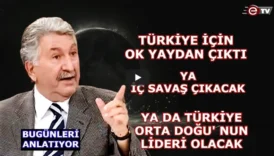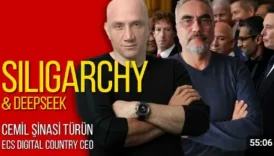Is Jesus’ Return Near? Striking Prophecies from Mehmet Ali Bulut!
SUMMARY: Researcher and author Mehmet Ali Bulut defended the economic contribution of refugees in Turkey. Bulut claimed they provide cheap labor, preventing higher inflation, and made striking eschatological predictions, especially regarding the return of Jesus Christ.
- Is Jesus’ Return Near? Striking Prophecies from Mehmet Ali Bulut!
- Mehmet Ali Bulut's Prophecies: The Return of Jesus and the New Age
- "If Not for Refugees, You'd Eat Salad for 15 Lira!" Economic Contribution of 'Cheap Labor'?
- Demographic Balances and Criticism of Settlement Policy: "Antep is Ruined!"
- The Europe Factor and State Policy Suggestion
- Being a Muslim in This Age: Emphasis on Morality, Sincerity, and the "Firm Rope"
- The Decline of Western Civilization and the Israel Factor: "God's People Are in Trouble with Allah"
- Final Thoughts
(Brief Info: Who is Mehmet Ali Bulut?)
Mehmet Ali Bulut is a researcher, author, and commentator known for his research, books (including works like “God’s People Are in Trouble with Allah”), and television appearances, particularly on topics such as Sufism, history of religions, eschatology (the study of end times), mythology, symbolism, and alternative health. He is known for his unique interpretations, perspectives combining different disciplines, and approaches to esoteric subjects.
Mehmet Ali Bulut’s Prophecies: The Return of Jesus and the New Age
Researcher and author Mehmet Ali Bulut, in statements made on a program he attended, shared his eschatological predictions about the world being at a critical threshold, drawing particular attention with his claims regarding the return of Jesus Christ. Pointing out that the Mayan and Hebrew calendars have ended, specifically noting 2024 as an endpoint according to the Hebrew calendar, Bulut stated that a new and critical era has begun following this conclusion.
Bulut said that the period between 2024 and 2083 (or 2076) will be very important for humanity: “This is a very critical time. During this period, until 2024-2076/83, we will live in a very beautiful time. It will be good in eschatology; all goodness will manifest in this environment.”
The Claim of Jesus’ Return and Global Islamization
Mehmet Ali Bulut expressed his belief that Jesus Christ will return to Earth during this critical period and suggested this would lead to major global changes. He claimed that starting particularly from 2027, Christianity in the Western world will enter a process of “tasaffi” (purification): “What we call Jesus Christ, from 2027 onwards, a movement will begin in the Western world. These will be the purification efforts of Christianity. Christianity will purify itself, the old Christian ways will fade, and it will amend itself with the Qur’an.”
Bulut argued that at the end of this process, people will turn to Islam in masses: “Thus, a tremendous trend will emerge in the world. A time will come when people embrace Islam continent by continent, group by group, country by country,” he said. He predicted this period would be a “tremendous delight” and era of peace lasting about 20-25 years, a generation.
Apocalypse Scenarios After the Golden Age
However, according to Bulut, a great dissolution and period of destruction will begin after this “golden age.” Pointing to apocalyptic scenarios, Bulut stated, “Then, with a great dissolution, we will proceed to the scene of the apocalypse. Gog and Magog will emerge. From 2076 onwards, the Earth will truly not be a very habitable place. Both in terms of resources, earthquakes, volcanic eruptions, meteor strikes, and the terrible corruption of humanity.” Bulut depicted this era as a chaotic environment like in the “Mad Max” films, where people kill each other for basic needs and a drop of water.
“If Not for Refugees, You’d Eat Salad for 15 Lira!” Economic Contribution of ‘Cheap Labor’?
Alongside his eschatological predictions, Mehmet Ali Bulut also touched upon current issues, offering a different perspective on the subject of refugees (Afghans, Syrians) in Turkey. Contrary to common public opinion, he argued that this population is a necessity for the country’s economy. Stating that the definition of “refugee” is different, Bulut claimed that the presence of Afghans and Syrians in Turkey curbs inflation: “If Afghans and Syrians weren’t here in Turkey right now, if you eat salad for 5 lira, you would be eating it for 15 lira. If you live in an apartment for 15,000 lira, you would be paying 30,000 lira. If you eat olive oil for 250-300 lira per kilo, you would be eating it for 500 lira.”
Mehmet Ali Bulut attributed the main reason for this to the Turkish society’s unwillingness to work in jobs requiring “cheap labor”: “The Turkish nation doesn’t work anywhere. Previously, our Kurdish brothers from Eastern provinces worked in construction; now we are starting to leave construction to them too. Because Turks don’t work cheap. They want to sit around, get paid 60-70 thousand lira, just showing up should be enough, without doing a damn thing.”
Bulut emphasized the significant role of Syrians and Afghans in sustaining sectors like agriculture, textiles, and shoemaking: “Turkey is still an important player in textiles and shoemaking. It’s the Syrians who keep both afloat. We need to see this. They pick the hazelnuts, they pick the olives, they do the labor, Afghans do the shepherding. And you are here living in comfort, putting your feet up, pontificating, making heroic speeches. Is this what the country is about?”
Giving an example from his own olive farming experience, Bulut said, “If Turks were to pick my olives, how much would my olive oil cost? If it costs 250-300 lira now, it’s because they pick it cheap. If our Turks picked it, they’d ask for 300 lira daily wage; he (the refugee) asks for 50-100 lira (for last year). This affects the cost,” arguing that the cheap labor provided by refugees lowers costs. Therefore, he stated he was not against the presence of Syrians and Afghans in Turkey.
Demographic Balances and Criticism of Settlement Policy: “Antep is Ruined!”
While defending the economic necessity of refugees, Mehmet Ali Bulut harshly criticized Turkey’s lack of policy on the matter, especially the mistakes in settlement strategy. Stating that very large population movements can disrupt the nature of a nation, Bulut gave the example of Gaziantep: “Antep is ruined. I spoke about this with its governor and its mayor. It’s disrupting its nature.”
Bulut pointed out the danger of settlements made without considering the ethnic and cultural balance in specific regions: “This country has no settlement policy. Now, İslahiye is relatively a Kurdish region. If you add new Kurdish-speaking population here, you disrupt the balance. You shouldn’t take Kurdish-speaking Syrians from Afrin and settle them there. Where will you take them? You will settle them in regions where the Turkish population is dense.” Bulut stated that wrong policies prepare the ground for social provocations: “A lot of people provoke the Syrians, provoke the Afghans, because they are being denigrated,” he said.
Mehmet Ali Bulut, while citing Germany’s policy of importing labor, also noted that those coming to Turkey are generally unskilled: “The people we sent to Germany were not very qualified… Why would qualified people come? Qualified people already live well in Syria and Afghanistan. Unskilled, unqualified people will come, of course.”
The Europe Factor and State Policy Suggestion
Mehmet Ali Bulut criticized Turkey for keeping refugees within its borders instead of sending them to Europe, arguing that the state should stand firmer against the West on this issue: “The state could have done this: Why don’t you send them to Europe? Send them, let it be the world’s problem. No, you keep them here. Then you should tell the West, ‘Look, I’m not sending them to you, I will host this population here, give me the means.’ It fails to do this too.” He stated that this situation justifies anti-refugee complaints but ignores economic realities.
Being a Muslim in This Age: Emphasis on Morality, Sincerity, and the “Firm Rope”
Touching upon the challenges of the current era, Mehmet Ali Bulut emphasized that true Muslimhood lies beyond formal worship, in high morals and sincere devotion (ikhlas) to Allah. “Get up at night to pray, fast during the day; these are things of the past. Because the foundation of positive worship is sincerity. There is no environment to ensure sincerity. You can’t even achieve it in prostration. There’s music everywhere, drunkenness everywhere, entertainment everywhere, constant acts that belittle the sacred,” he said, stating that the modern world damages spirituality.
He said the path to salvation in this age, referring to the Quranic metaphor of “holding fast to a firm rope,” is through high morals and standing with the Truth (Haqq): “Whoever rejects false gods and believes in Allah has grasped the most trustworthy handhold… In this age, high morals and religion are possible through partisanship for the Truth.” Bulut stated that Muslims living in this period must be “numune,” i.e., examples; being an embodiment of morality, beauty, and a good person brings salvation.
The Decline of Western Civilization and the Israel Factor: “God’s People Are in Trouble with Allah”
Mehmet Ali Bulut claimed that Western civilization is in decline and the fundamental reason for this decline is the Israelites (Jews) using the West for their own interests. Referring to his own book titled “Tanrının Halkının Allah ile Başı Dertte” (God’s People Are in Trouble with Allah), Bulut said:
“The Israelites began to use Western culture, Western civilization for their own interests and benefits. Normally, what elevates a civilization is justice, the guarantee of morality. Human life security, happiness, law, rights… These are crucial. The West had captured a reality, a human trend through the truth of Christianity. America, Australia were products of this civilization.”
However, according to Bulut, the Israelites instrumentalized this healthy power for their own interests through oppression: “The West lost all its truth. Because the West showed it could commit injustice, hypocrisy, massacres without hesitation for profit, for its own interest. Thanks to what? Thanks to Israel. To protect Israel’s interests… Thus, the West lost its sanctity, its sense of justice, and is no longer a civilization to be taken as a reference.”
Bulut stated that his book explains how the decline of the West began with the effort to guarantee Israel’s interests, and argued that the suffering in the Middle East for 150 years was also artificially created to serve Israeli interests: “The Iraq war, the Syria war, all the terrorist incidents in the region were financed and organized for the same reason, by the same people. Because of the Israelites, Western civilization stained its hands with so much blood, polluted its existence so much, that it cannot end without paying the price. That’s why a very heavy price is coming.”
Mehmet Ali Bulut indicated that his book shows with various signs that this “time of reckoning” has arrived and that according to prophecies in the Torah, Allah will punish the Israelites at the end of days, but before that, other nations in the region (Iraq, Assyria, Lebanon, etc.) will also pay a price. “Then Israel will pay the price wholesale. Because of the weight of that price, we said they are in trouble with Allah,” he explained, clarifying the title of his book.
Final Thoughts
Researcher and author Mehmet Ali Bulut’s statements, ranging from the economic role of refugees to critiques of global politics and striking eschatological prophecies, evoked both astonishment and deep thought among listeners. Bulut’s firm belief in a great reckoning and transformation in the near future, and his thesis that Western civilization is heading towards moral collapse due to the Israel factor, offer a different perspective on the events of the coming years. Especially his prophecies pointing to the return of Jesus Christ, the period between 2024-2083, and the subsequent great chaos add a new dimension to ongoing discussions about the future.





